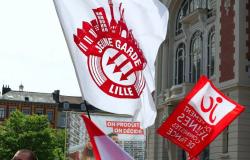The Taliban have been urged to “include women” in public life, a UN official said in Doha on Monday at a conference on Afghanistan in which Afghan government officials agreed to participate if civil society was excluded.
The two-day meeting, which began Sunday, is the third of its kind held in Qatar in just over a year, and the first to include Taliban officials who regained power in 2021.
Taliban representatives were excluded from the first round of UN negotiations in May 2023 and refused to participate in the second round in February, demanding that members of the government be the country’s sole representatives.
This condition was eventually accepted and representatives of civil society, especially women, were excluded. But the mere presence of government representatives drew criticism from human rights organizations.
Civil society will not be able to speak until Tuesday, the day after official discussions between the government delegation, led by its spokesman Zabihullah Mujahid, and UN officials and more than 20 special envoys.
The Taliban authorities “will not sit around a table with Afghan civil society in this framework, but they have heard very clearly the need to include women and civil society in all aspects of public life,” UN Under-Secretary-General for Political Affairs Rosemary DiCarlo told reporters on Monday.
The talks are aimed at discussing increased international engagement in Afghanistan, a poor country of more than 40 million people, and a more coordinated response, particularly on economic issues and the fight against narcotics.
Since their return to power, the Taliban have not been officially recognized by any country.
– “Give in to the Taliban” –
They apply an ultra-rigorous interpretation of Islam, multiplying liberticidal measures against women, a policy described as “gender apartheid” by the UN.
Ms DiCarlo, who chaired the UN talks in the Qatari capital, said she “hoped” that “the Taliban government’s policies regarding women in public life, including the education of girls, would be reviewed”.
But for Agnès Callamard, president of Amnesty International, speaking before the talks, “yielding to the Taliban’s conditions to ensure their participation in the talks would risk legitimising their system of institutionalised gender-based oppression”.
The United States said it had agreed to participate in the talks on Monday after receiving assurances that human rights would be addressed in a meaningful way.
State Department spokesman Vedant Patel said that in Doha, U.S. envoy for Afghanistan Thomas West and U.S. special envoy for Afghan women’s rights Rina Amiri “made it clear that the Afghan economy cannot grow unless the rights of half the population are respected.”
Taliban authorities have repeatedly claimed that the rights of all citizens are guaranteed under Islamic law.
At the opening of the summit on Sunday, Zabihullah Mujahid stressed that “the Islamic Emirate of Afghanistan is keen to engage constructively with Western nations.”
But, he stressed, “like any sovereign state, we defend certain religious and cultural values, and public aspirations that must be recognized.”
The Kabul government delegation was due to discuss “financial and banking sanctions” and the “challenges” they pose to the Afghan economy on Monday, Zakir Jalaly, a senior foreign ministry official, told X.
“Afghans are wondering why they are subjected to unilateral and multilateral sanctions,” Zabihullah Mujahid had said the day before, wondering whether it was a “fair measure” after “wars and insecurity for almost half a century due to foreign invasions and interference.”
Di Carlo said on Monday that the issue of sanctions had been “raised” but not discussed in depth.
“It is up to the member states to decide whether they will maintain certain sanctions or not. Sanctions concern individuals, not the country as a whole,” she argued.





